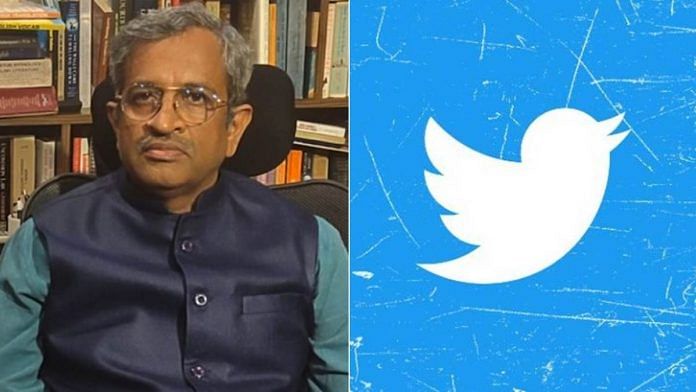
New Delhi: There is no “positive obligation” on Twitter’s part to further the freedom of speech and expression of Indian citizens, a protected fundamental right under the Constitution, the US-based micro-blogging site has told the Delhi High Court.
Responding to senior advocate Sanjay Hegde’s petition that sought restoration of his suspended Twitter account, the company claimed that there is no element of public function involved in its services that are purely in the nature of a contractual relationship with the user.
Therefore, Twitter added, it cannot be subjected to an Indian court’s jurisdiction for enforcement of an individual’s fundamental right, as demanded by Hegde.
In December 2019, the senior advocate had invoked the jurisdiction of the HC when he filed a petition under Article 226 of the Constitution to restore his Twitter account. He had raised a two-fold argument in his petition — that Twitter imparts a public function and that the nature of activities undertaken by Twitter is in furtherance of one’s Fundamental Right to Free Speech.
However, Twitter’s affidavit disputes Hegde’s argument. It said since it is in contractual obligation with Hegde, the company has the right to suspend his account if it is in violation of the User Agreement and its policies.
In taking action against the senior lawyer’s account, it has merely discharged its contractual obligations, the affidavit submitted. Hegde, it added, had agreed upon the contractual conditions at the time of signing up for the services on Twitter and he, therefore, should raise his grievance before an appropriate forum, as given in IT rules, the company said.
Beyond the ‘territorial boundaries of India’
In its commercial venture, Twitter incidentally also serves the ends of freedom of speech and expression, but it would not convert the nature of the activity as such, the affidavit said.
“Myriad activities of private non-State entities may touch upon fundamental rights, but the same is not a sufficient predicate to bring them under the writ jurisdiction of the High Courts,” it said.
The company argued that its services in no matter are relatable to any function of the State, having sovereign functions. Also, Twitter claimed, it is not in “any manner a state protected monopoly, since there are multiple other service providers, which are intermediaries discharging similar functions”.
As Twitter’s services extend beyond the “territorial boundaries of India”, it cannot be said that it “owes a duty to the Indian public to facilitate free speech and expression”, submitted the affidavit.
Twitter presented multiple Supreme Court judgments to underline the meaning of the term, “public function”, and counter Hegde’s plea that it was obliged to protect his rights to free speech and expression.
The elements of a “public function,” it said, would comprise existence of a positive obligation to perform a public duty and establishment of a body that must seek to achieve some collective benefit for the public and be accepted by the public as having authority to do so.
Moreover, the function of such a body must be of a character closely related to functions which are performed by the state in its sovereign capacity, the company said, adding that the said function should not be in the nature of a commercial activity for profit motive.
(Edited by Paramita Ghosh)
Also read: Muslim women ‘on sale’ — website targets journalists, activists, taken down after outrage
Subscribe to our channels on YouTube & Telegram
Why news media is in crisis & How you can fix it
India needs free, fair, non-hyphenated and questioning journalism even more as it faces multiple crises.
But the news media is in a crisis of its own. There have been brutal layoffs and pay-cuts. The best of journalism is shrinking, yielding to crude prime-time spectacle.
ThePrint has the finest young reporters, columnists and editors working for it. Sustaining journalism of this quality needs smart and thinking people like you to pay for it. Whether you live in India or overseas, you can do it here.